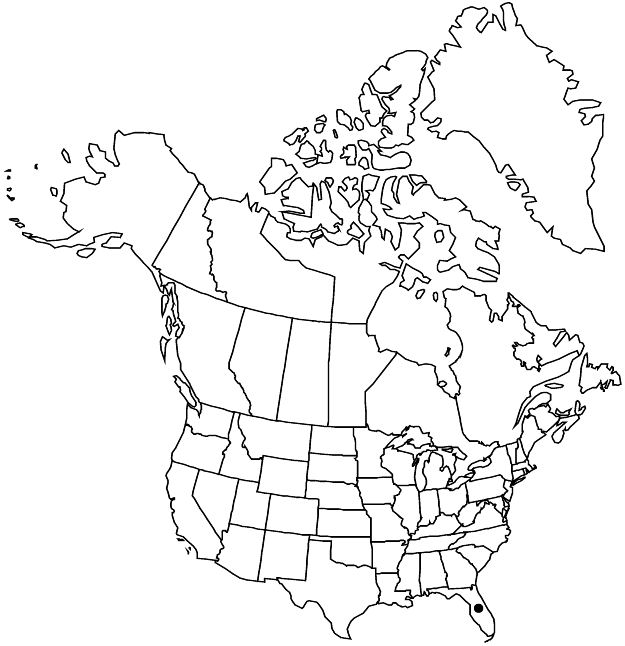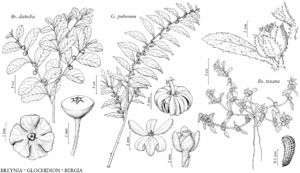Difference between revisions of "Breynia disticha"
Char. Gen. Pl. ed. 2, 146, plate 73. 1776.
FNA>Volume Importer |
imported>Volume Importer |
||
| (3 intermediate revisions by 2 users not shown) | |||
| Line 12: | Line 12: | ||
}}{{Treatment/ID/Special_status | }}{{Treatment/ID/Special_status | ||
|code=F | |code=F | ||
| − | |label= | + | |label=Illustrated |
}} | }} | ||
|basionyms= | |basionyms= | ||
| Line 18: | Line 18: | ||
|name=Breynia nivosa | |name=Breynia nivosa | ||
|authority=(W. Bull) Small | |authority=(W. Bull) Small | ||
| + | |rank=species | ||
}} | }} | ||
|hierarchy=Phyllanthaceae;Breynia;Breynia disticha | |hierarchy=Phyllanthaceae;Breynia;Breynia disticha | ||
| Line 33: | Line 34: | ||
|elevation=0–10 m. | |elevation=0–10 m. | ||
|distribution=Fla.;Pacific Islands;introduced also in West Indies;Indian Ocean Islands. | |distribution=Fla.;Pacific Islands;introduced also in West Indies;Indian Ocean Islands. | ||
| + | |introduced=true | ||
|discussion=<p><i>Breynia disticha</i>, native to New Caledonia and Vanuatu, is widely grown in tropical and subtropical areas and occasionally becomes naturalized. In the flora area, it is limited to scattered counties in southern Florida. Most plants are cultivars with variegated leaves in various shades of green, white, red, and pink; naturalized populations may revert to uniformly green leaves. The calyx typically reproduces the colors of the leaves, sometimes even being variegated.</p> | |discussion=<p><i>Breynia disticha</i>, native to New Caledonia and Vanuatu, is widely grown in tropical and subtropical areas and occasionally becomes naturalized. In the flora area, it is limited to scattered counties in southern Florida. Most plants are cultivars with variegated leaves in various shades of green, white, red, and pink; naturalized populations may revert to uniformly green leaves. The calyx typically reproduces the colors of the leaves, sometimes even being variegated.</p> | ||
|tables= | |tables= | ||
| Line 42: | Line 44: | ||
-->{{#Taxon: | -->{{#Taxon: | ||
name=Breynia disticha | name=Breynia disticha | ||
| − | |||
|authority=J. R. Forster & G. Forster | |authority=J. R. Forster & G. Forster | ||
|rank=species | |rank=species | ||
| Line 57: | Line 58: | ||
|publication title=Char. Gen. Pl. ed. | |publication title=Char. Gen. Pl. ed. | ||
|publication year=1776 | |publication year=1776 | ||
| − | |special status=Introduced; | + | |special status=Introduced;Illustrated |
| − | |source xml=https:// | + | |source xml=https://bitbucket.org/aafc-mbb/fna-data-curation/src/2e0870ddd59836b60bcf96646a41e87ea5a5943a/coarse_grained_fna_xml/V12/V12_1102.xml |
|genus=Breynia | |genus=Breynia | ||
|species=Breynia disticha | |species=Breynia disticha | ||
Latest revision as of 19:13, 5 November 2020
Shrubs, 0.5–3 m. Leaves on main stems spiral. Leaves on ultimate branchlets distichous; petiole 2–4 mm; blade elliptic to ovate or suborbiculate, 1.5–4 × 1–3 cm, base obtuse to rounded, apex rounded. Pedicels: staminate 6–9 mm, pistillate 3–9 mm. Staminate flowers: calyx top-shaped, truncate, 1.5–3 mm. Pistillate flowers: sepals obovate, 1–5 mm. Capsules 5 mm diam., smooth. Seeds brown, 2–3 mm. 2n = 52 (Jamaica).
Phenology: Flowering and fruiting summer.
Habitat: Disturbed sites.
Elevation: 0–10 m.
Distribution

Introduced; Fla., Pacific Islands, introduced also in West Indies, Indian Ocean Islands.
Discussion
Breynia disticha, native to New Caledonia and Vanuatu, is widely grown in tropical and subtropical areas and occasionally becomes naturalized. In the flora area, it is limited to scattered counties in southern Florida. Most plants are cultivars with variegated leaves in various shades of green, white, red, and pink; naturalized populations may revert to uniformly green leaves. The calyx typically reproduces the colors of the leaves, sometimes even being variegated.
Selected References
None.
